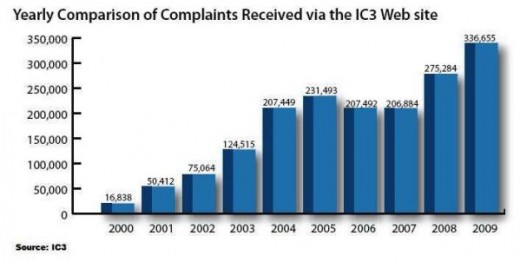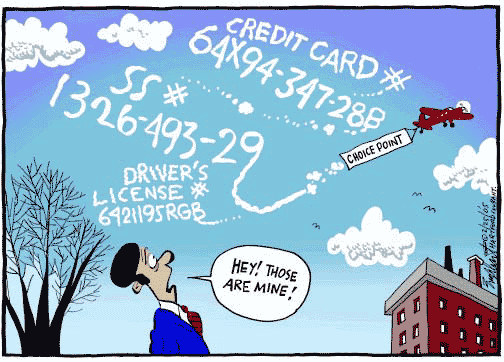Cyber Crime

What is Cyber Crime?
Cyber crime is any illegal or criminal activity involving the use of a computer and a network, net crime is criminal exploitation of the Internet. While there are actually thousands of cyber crimes, these are a few of the most common: identity theft, stealing money from online bank accounts, downloading illegal music files, distributing viruses, and posting confidential information on the Internet.
Cyber crime costs rise annually in the United States, losses were estimated at more than 500 million dollars in 2009. Men are more likely to fall for online scams, costing men an average of $150 more than women each year With more and more online fraud costs, it makes sense to protect yourself from hackers and online scams.
A Global Threat
Where to Report Cyber Crimes
Protect Yourself
The Internet is used for a multitude of purposes including: finding old friends, genealogy research, social networking, shopping, banking, applying for jobs, and downloading music. With the ever increasing usage of the internet, it is more important than ever to take the necessary preventative measures to ensure your safety while online.
Educate yourself against cyber crime, it's important to be aware of the current illegal trends to help reduce the risk of falling victim to identity theft. Awareness and education about cyber crimes are the two most important things you can do to protect yourself against cyber crime.
Don't share personal information with people you don't know, and only share minimal information while online. While you may think that you have met someone online you can talk to in a chat room or on a forum, be aware that this is sometimes the way criminals piece together your personal information in order to steal your identity.
Never enter passwords or personal information on links you receive in emails. Emails are a primary source for hackers and phishing scams. Go to websites directly by using the URL and make sure the web page is secure. A web page is secure when you see the small padlock icon on the lower left hand side of your computer screen.
Be weary of downloading attachments from email, viruses and other damaging files are often sent in email attachments. As the saying goes, "If it sounds too good to be true, it probably is."


Protect Your Computer
Protecting your computer can be done with little or no cost, depending on the desired protection, to help protect your personal information & identity. When your computer is secure with the appropriate features, it helps keep other users (and yourself) protected from unwanted users that may have access to your pc.
Turn on your spam blocker to prevent fraudulent and phising emails from getting to your inbox. Always keep your computer's firewall protection feature turned on to prevent hackers from getting into your computer system.
Anti-virus software for your computer can be purchased for a reasonable price. Some of the top rated programs include: McAfee, Norton Anti-Virus, and Stopzilla. Free versions, such as AVG, are used by many internet surfers across the country.
Utilize encryption software to make it unintelligible to any potential hackers. If you like to shop online, be sure to make sure the website you shop on has a TRUSTe or VeriSign seal. If you submit your credit card and other personal information to a site that is not secured, you run a greater risk of being a victim of cyber crime.

Be Your Own Detective
- Net Detective Main Home Site Since 1996
Net Detective is an easy to use online system where people and businesses can search for information about anyone! We have over 1.1 billion records for 211,461,546 U.S. Citizens -- that's over 90% of the U.S. population!
Computer Forensics
With the increase in computer crimes, many people are choosing computer forensics careers. Computer forensic specialists are in higher demand, especially over the last few years, due to the increase in cyber crimes. It is a challenging career choice, and getting into school and graduating takes hard work and determination.
Computer forensics focuses on the right way to recover covert data and deleted and/or encrypted files. It is also used as a means of identifying illegal actions by utilizing sometimes only small traces of information left behind on computer hard drives. Computer forensics professionals have the ability to detect hidden files and recover valuable computer information.
Computer forensics graduates are qualified and authorized to work on some forensic investigations that are admissible in court for prosecution. Depending on the graduates certification or degree level, one is in an area of expertise that can be quite rewarding financially.


Parenting Articles
- Cloth Diapers and Your Baby
Diapering babies until they can be potty trained is as old as time itself. The term "diaper" , or as it is called in the UK, Austrailia, and Ireland, "nappy" , is a piece of clothing worn by individuals who... - Stress and the Stay at Home Parent
Stay at home parents are becoming more popular than in times past, and it's no wonder with the expense of childcare, and the hassle of finding someone trustworthy, that more parents are choosing to stay at... - Latchkey Kids Safety
The term latchkey kids has been around since just after World War II. During wartime, many wives of the men in service had to work outside the home to make ends meet, leaving children at home alone after...

Identity Theft Humor







